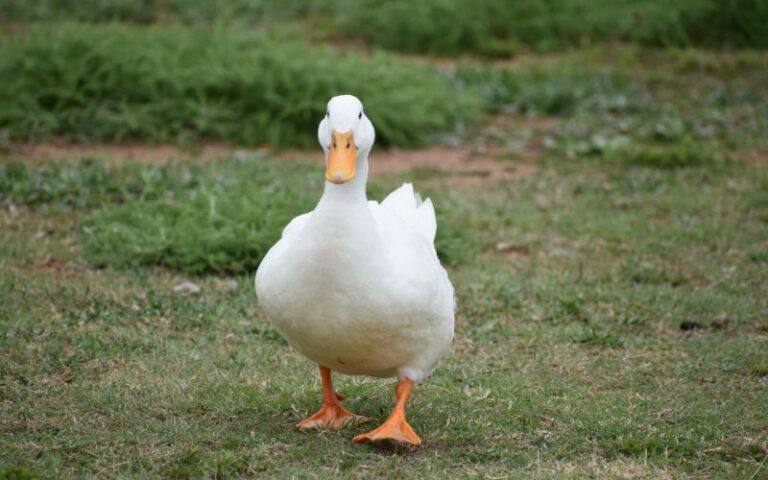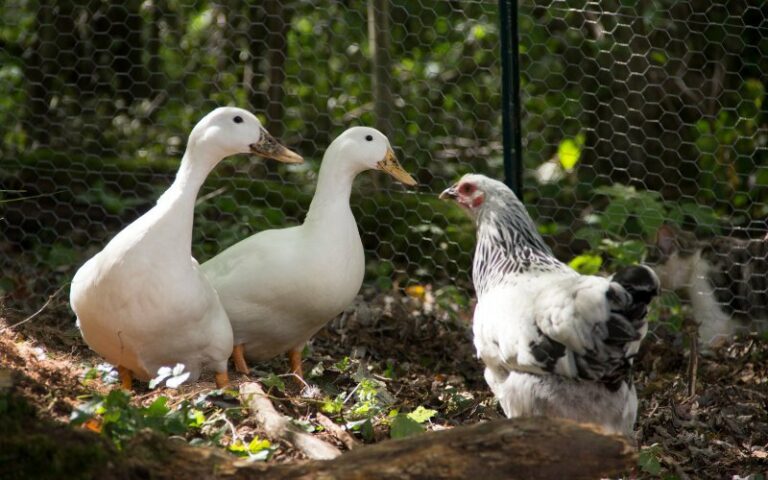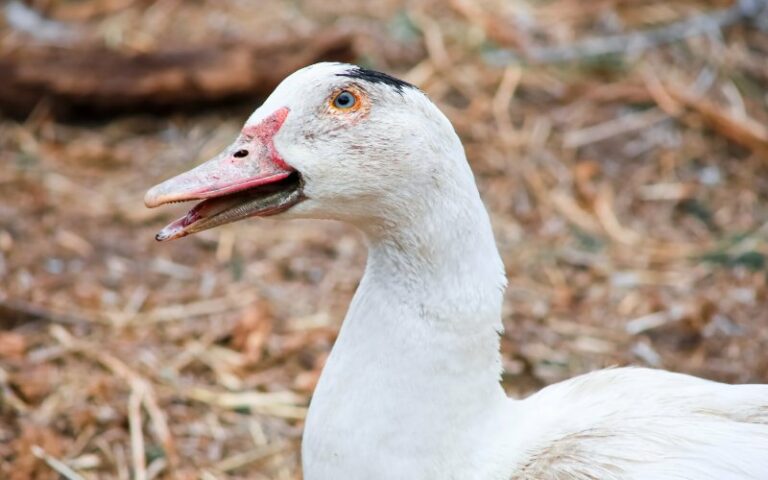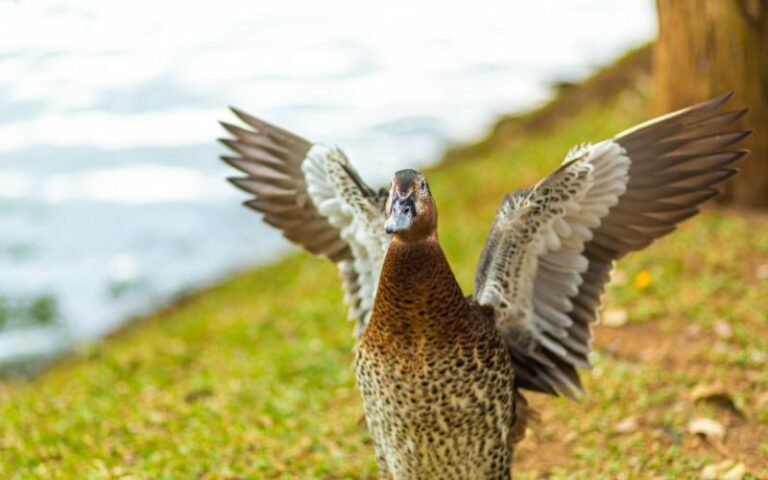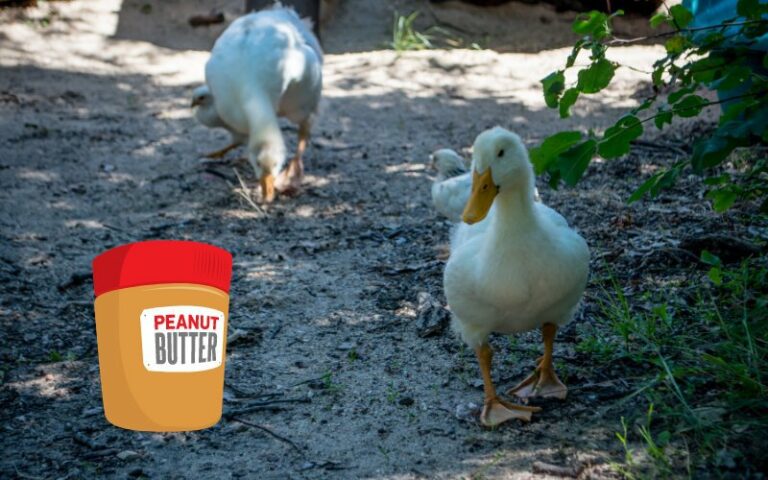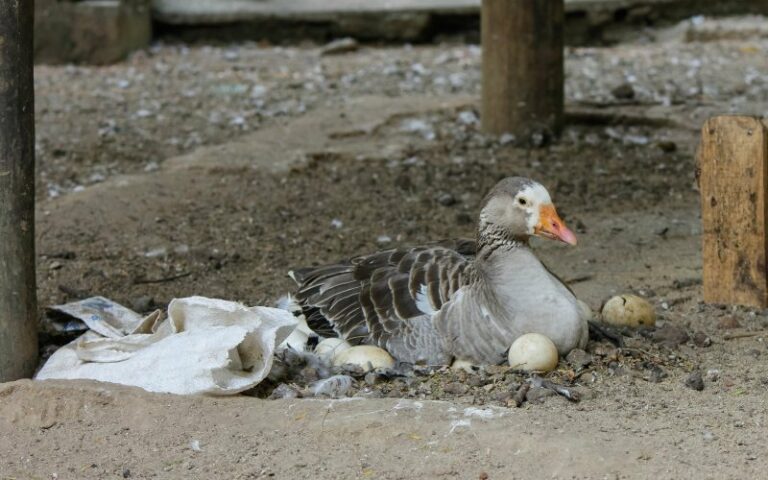Why is My Duck Losing Feathers? (Causes + Solutions)
Walking into your duck pen and noticing a snow drift of down one morning can be cause for alarm. While it could just be time for your ducks to molt, there are nearly a dozen other common reasons ducks can lose their feathers. Below you can learn what these are and what you can do to slow or stop the loss if you catch yourself asking, “Why is my duck losing feathers?”.
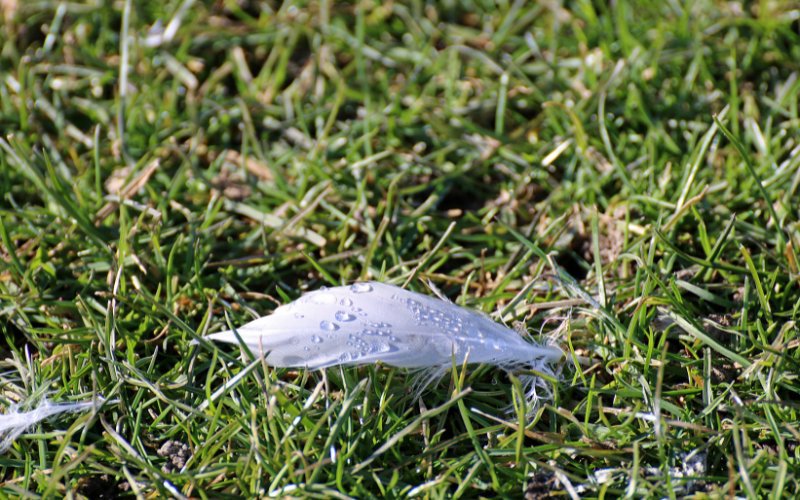
Why Is My Duck Losing Feathers? (The Short Answer)
Most often, a duck or drake will lose its feathers because it is molting. Ducks will molt once a year, often when the weather warms up. However, poor health as well as bullying and stress can lead to feather loss outside of or in conjunction with the molting season.
10 Possible Reasons for Ducks Losing Feathers
Ducks can be remarkably resilient creatures, especially when allowed to roam and forage in a large area. However, if they are penned up with infrequent access to forage or in a space that does not resemble a natural habitat, they can easily become stressed or develop issues that lead to poor health and overall feather loss.
Malnutrition
Aside from the regular molting season, malnutrition is one of the leading causes of feather loss. Ducks require more calcium, protein, fat, and B vitamins than chickens. Even feeding an “all flock” food can lead to a calcium deficiency if you have a flock of young laying ducks.
A hallmark of feather loss due to malnutrition is feathers growing in or becoming “tilted”. If your duck’s feathers appear to be growing at the wrong angle and cannot be easily moved back into place by brushing your hand across them, you may be looking at a vitamin deficiency. Further, feather loss, especially primary feather loss, in the winter can mean a lack of calcium.
Toxicity
Ducks that are exposed to mold may inhale mycotoxins. Mycotoxin exposure may not cause ducks to lose feathers outright if they can still properly groom themselves. However, birds exposed to aflatoxins, a subset of mycotoxins, have been known to pick at their feathers. They may even develop the habit of plucking out their feathers, creating notable bald patches.
This feather-plucking behavior is thought to be caused by heightened levels of anxiety, in the same vein as how some people chew their fingernails.
The Weather
In early summer or as the weather begins to heat up in late spring, all ducks will lose at least some of their fluffier feathers to keep themselves cool. If you’re wondering, “Why is my duck losing wing feathers?” and it just happens to be the end of summer, your duck is likely responding to the changing of the seasons.
Drakes in particular will lose wing feathers and primary feathers at this time. Feather loss, aside from a few accidental losses here and there, should not happen during the winter.
Molting
Ducks should molt once a year. For drakes, this often happens in mid to late summer while for ducks it often happens in late spring, depending on their age and if they are prone to broody behavior. The molting process should be complete in 4 to 6 weeks, depending on the age and size of the duck.
Brooding
Female ducks often molt during the time of year that they would be building a nest. The feathers they use would be woven into this nest to create a more comfortable home for their eggs and, later, ducklings.
However, occasionally something will trigger a duck to feel broody, or like hatching a clutch of eggs, outside of the standard season. This can trigger off-season molting and comes with a host of other symptoms such as hiding eggs, not laying eggs, chasing away other ducks, and building a new nest.
Other Ducks (Bullying)
If you have too many drakes, they may be bullying each other or the ducks they are kept with. This bullying can take the form of feather plucking. Ducks may also sometimes single out one of a number to systematically bully by plucking out their feathers. If this is the reason your duck is losing feathers, you should be able to identify it if your drakes or ducks consistently chase the victim.
Mites and Other Skin Parasites
Mites and other parasites can cause feather loss in two ways. First, they can irritate the feather to the point of damaging its shaft and causing it to die. The feather will then either drop off right away or during the next molt. Ducks with mites may molt more severely than ducks without mites. Alternatively, ducks with mites can over preen or develop a feather-picking behavior that leads to feather loss.
Lack of Deep Water
Ducks, unlike chickens, do need deep water. They need it to maintain proper hygiene and keep cool in warmer seasons. Without enough deep, clean water to use for grooming, ducks can develop a variety of skin and feather conditions, some of which cause feather loss right away or the growth of mold and bacteria on the skin that can then lead to infection and then feather loss.
When a duck finds a pool of clean, deep water, it prompts them to preen. This means they will apply oil from the gland at the base of their tail to their feathers. If this is not done regularly, the feathers may become dirty more quickly and lose their ability to repel water and may instead hold on to moisture. This often results in an overgrowth of bacteria and even mold.
Stress and Harassment from Predators
Stress can result from any of the above situations and may compound the rate and amount of feathers lost. However, stress can also result from more indirect circumstances. Ducks have fairly good hearing. Even when they are locked up securely in a covered pen or coop at night, regular sounds of scratching, digging, barking, and howling can cause enough stress over time that a duck will start to lose its feathers.
In addition to feather loss, excessive quacking and an inability to settle down at night can be a result of predator sounds or predators circling a duck’s enclosure during the night. The longer the root problem or problems persist, the longer it will take for lost feathers to return.
Infection and Overall Poor Health
Ducks that have an injury or infection may be unable to produce new feathers or may lose old feathers as their resources are devoted to more important activities. As long as the infection is being treated and the duck is kept warm, this feather loss should not be concerning and should clear up shortly after the infection or other health issue has been resolved.
How to Stop Ducks Losing Their Feathers (What to Do)
If you are just now noticing feather loss and asking, “why is my duck losing feathers?”, the steps below can help you curb additional losses and bring your ducks back to a healthy, stable state.
Determine the Cause
Observe your ducks and eliminate as many causes of feather loss as you can. Is there bullying? If so, this could be your root cause and you should separate or cull the offending ducks or drakes. Do any of your ducks have mites? If so, this should be treated and you may notice that feather loss stops. Are any of the ducks panting? If so, your ducks may be losing feathers due to heat stress and should be given access to a swimming pool and, if possible, a fan. Use the list of 10 possible reasons your duck is losing feathers above and eliminate as many possible causes as possible.
Scrub Everything
If there is no obvious cause, you may have a mold, mildew, or allergen problem. In this case, you should clean out the coop, scrubbing and disinfecting as much as possible. Use fresh, dry litter with little dust to cover the floor once everything is dry. Also, take the time to clean any water pools, fill in any standing puddles, and remove weeds from your duck pen or enclosure.
Increase Outdoor Time
Sunlight and fresh air can work wonders to help your ducks relieve stress and heal from any anxiety or illness-related feather-picking behavior.
Provide Better Light
If your ducks must be kept indoors due to concerns about the transmission of avian illness, snow or heavy rain, predators, or another concern, ensure they have proper light. Providing full-spectrum light or lights with a band close to that of sunlight can help them feel more at ease and reduce or halt feather loss due to stress or a disconnect from their natural rhythms.
Evaluate Water and Nutrition Quality
Are your ducks getting enough of the nutrients they need? Is their water deep enough and cleaned daily? Ducks, unlike chickens, often need at least a calcium supplement from Spring through Fall. A lack of calcium can lead to excessive molting and feather loss.
Treat Health Problems
If you have gone through the above list, made any possible changes, and things have still not improved or your duck has developed lesions or sore spots- take them to a vet. A severe health problem can cause feather loss or prevent your duck from recovering after molting.
Discourage Predators and Noise
Scare tape, motion-sensitive lights, or traps can all be used to discourage or eliminate predators that may be stressing your ducks out to the point of losing feathers.
4 Strategies to Prevent Ducks from Losing Their Feathers in the First Place
Now that you have a better idea of why your duck may be losing feathers, there are steps you can take to prevent this concerning condition. However, please keep in mind that ducks should never be encouraged to skip the natural molting process. A molt should take place each year; your ducks will lose quite a few feathers during this process.
Choose Duck-Specific Nutrition and Supplements
Ducks have different nutrient needs than chickens, guinea fowl, and other animals that they might be kept with. Chicken feed and “all flock” feeds are not enough. At the very least, ducks should be fed some form of leafy green or grass in addition to oyster shell or another chunky calcium supplement Spring through Autumn and into the winter if you want to have healthy ducks that lay eggs through the winter.
Keep Drakes Separate from Ducks
Unless you have a very small flock of 5 or fewer with a maximum of 2 drakes, it’s often best to keep your drakes separate from your ducks. This helps to discourage bullying and may reduce overall stress.
Allow Your Ducks to Swim
Ducks love water. They are designed to swim and make the most of deep water to keep themselves healthy. They are not chickens, an animal that can make do with a drip water bottle.
Ducks need daily access to water that is deep enough for them to easily submerge their head and neck. This helps reduce the likelihood of respiratory illness, makes it easier for them to eat, and allows them to stay clean. In the summer, especially if you live in a region where daily temperatures meet or exceed 80F, they should be able to swim to keep cool and reduce stress.
Keep the Coop Clean
Ducks have sensitive respiratory systems. They can also be extremely messy. These two factors combined can lead to a coop that needs daily maintenance.
Further, the litter used in duck coops can only be either clean grass hay, dry straw, or kiln-dried wood chips. Nearly any other medium can cause an allergic reaction or react poorly to the messes ducks can create. The litter should be changed at least once a week and the coop should be kept as dry as possible at all times.

